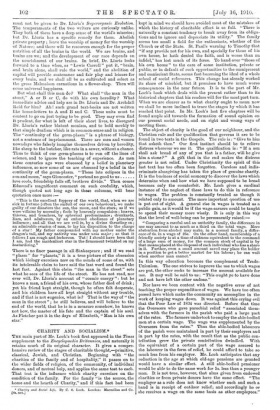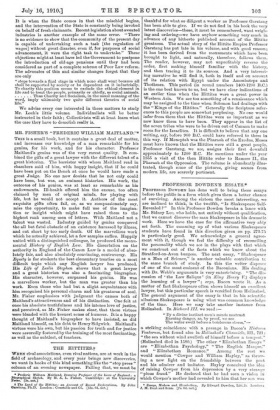CHARITY AND SOCIALISM.*
THE main part of Mr. Loch's book first appeared in the Times supplement to the Encyclopaedia Britannica, and naturally it retains much of its original character. It gives a compre- hensive review of the stages of charitable thought,—primitive, classical, Jewish, and Christian. Beginning with " the charities of the family and of hospitality," it passes on to the wider fields of religion, of the community, of individual donors, and of mutual help, and applies the same test to each. That test is the influence which charity exercises on the condition of the family. For the family "is the source, the home and the hearth of Charity," and if this fact had been • Charity and Social Life. By C. B. Loch. London: Macmillan and Co. E6s. net.]
kept in mind we should have avoided most of the mistakes of which the history of charitable effort is so full. "There is naturally a constant tendency to break away from its obliga- tions and to ignore and depreciate its utility." The family seems too small a field for the enthusiasts, whether of the
Church or of the State. St. Paul's warning to Timothy that "if any provide not for his own, and specially for those of his
own house, he hath denied the faith, and is worse than an infidel," has lost much of its force. To hand over "those of his own house" to the care of some institution, private or public, or in default of such opportunities to the omnipresent and omniscient State, seems fast becoming the ideal of a whole school of social reformers. This change has already worked its share of mischief, but it promises to have much worse consequences in the near future. It is to the part of Mr. Loch's book which deals with the present rather than to its historical chapters that his readers will for the most part turn. When we are clearer as to what charity ought to mean now we shall be more inclined to trace the stages by which it has reached that point. In Mr. Loch's last five chapters will be found ample aid towards the formation of sound opinion on our present social needs, and on right and wrong ways of meeting them.
The object of charity is the good of our neighbour, and the Christian rule and the qualification that governs it are to be
found in two texts in the Gospels. The rule is : " Give to him that asketh thee." Our first instinct should be to relieve distress wherever we see it. The qualification is : " If a son shall ask bread of any of you that is a father, will he give him a stone ?" A gift that in the end makes the distress greater is not relief. Under Christianity the spirit of this last text has too often been forgotten. Careless and indis- criminate almsgiving has taken the place of genuine charity.
It is the business of social economy to discover the laws which determine when and how what we have supposed to be bread becomes only the counterfeit. Mr. Loch gives a cardinal instance of the neglect of these laws to do this in reference to wages. The problem is constantly treated as though it related only to amount. The more important question of use is put out of sight. A general rise in wages is treated as a public gain, as it would be if the wage-earners could be taught to spend their money more wisely. It is only in this way that the level of well-being can be permanently raised :—
" Comparing a careful and an unthrifty family, the difference in use may amount to as much as a third on the total wage. Mere abstention from alcohol may make, in a normal family, a differ- ence of 6s. in a wage of 25s. On the other hand, membership of a friendly society is at a time of sickness equivalent to the command of a large sum of money, for the common stock of capital is by that means placed at the disposal of each individual who has a share in it. Further, even a small amount saved may place the holder in a position to get a better market for his labour ; he can wait when another man cannot."
In this way education becomes the complement of Trade. Unionism. The one strives to improve the use to which wages are put, the other seeks to increase the amount available for use. It may well be said to us : " This ought ye to have done and not have left the other undone."
Nor have we been content with the negative error of not teaching the proper expenditure of wages. We have too often passed laws which make the community an accomplice in the work of keeping wages down. It was against this crying evil that the Poor Law of 1834 was directed. Before that time the Overseers who gave parochial relief " associated them- selves with the farmers in the parish who paid a large part of the rates. The farmers undertook to employ the able-bodied men at a certain wage. The wage was supplemented by the Overseers from the rates." Thus the able-bodied labourers of the parish were maintained in part by their employers and in part by the rates, with the result that as the public con- tribution grew the private contribution dwindled. With the equivalent of a certain part of the wage assured to the labourer in the form of relief, he could afford to take so much less from his employer. Mr. Loch anticipates that any reduction in the age at which old-age pensions are granted would have a similar effect. A still able-bodied pensioner
would be able to do the same work for 5s. less than a younger man. It is not true, however, that alms given from endowed
charities or from private donors have the same effect. "The
employer as a rule does not know whether such and such a hand is in receipt of outdoor relief ; and accordingly he or
she receives a wage on the same basis as other employees." It is when the State comes in that the mischief begins, and the intervention of the State is constantly being invoked on behalf of fresh claimants. Recent legislation about sweated industries is another example of the same error. "There is no evidence to show that the community of the present day is capable of undertaking such a task [the regulation of wages] without great disaster, even if, for purposes of social advancement, it were the right task to undertake." These objections might at least have led the Government to postpone the introduction of old-age pensions until they bad been
considered as part of a complete scheme of Poor Law reform. The advocates of this and similar changes forget that they
are only
"steps towards a final stage in which none shall want because all shall be supported by society or be dependent on it industrially. To charity this position seems to exclude the ethical element in life and to treat the people, primarily or chiefly, as social animals.
Thus Charity and Socialism, in the usual meaning of the word, imply ultimately two quite different theories of social life."
We advise every one interested in these matters to study Mr. Loch's little volume. Individualists will be better instructed in their faith ; Collectivists will at least learn what the case they have to demolish really







































 Previous page
Previous page